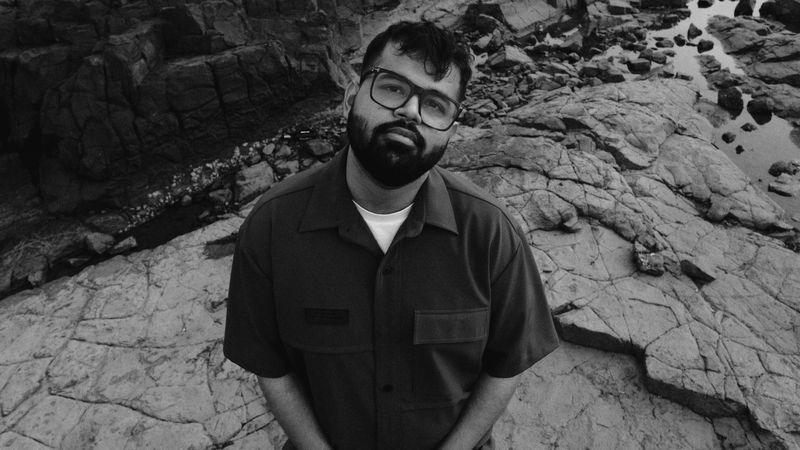A slow-motion love shot through warm electronic light and cultural shadows.
At its core, Hoor inhabits a moment of suspended awe. The world stops, the heart shifts, and the familiar becomes luminous. We’re not dealing with urgent longing or dramatic heartbreak. The dominant feeling is recognition. Quiet recognition of someone, someplace, and a feeling that you’re elsewhere now, even if you haven’t moved. That quiet shift is the thematic centre.
This track lives physically in the space between tradition and tomorrow. From the promotional context: the EP Marigold Soundsystem II is described as a “gentle ode to love and tradition.” That means Hoor carries cultural weight—not by referencing lineage or heritage overtly, but by feeling rooted in ritual and elevated by modern sound.
Genre-wise, the song pulls from multiple lanes: Punjabi pop, electronic subtlety, wedding-melody nostalgia. But it refuses to be just any one. The production leans late-night lounge rather than club anthem. That choice matters because the emotional tone of the song isn’t external spectacle—it’s internal shift.
Production highlights: The beat hovers. The synths breathe rather than pulse. The arrangement uses space—silences, ambient tails, minimal interference. That means when the vocal enters, your attention tightens. In a world of “fill everything with sound,” the restraint here amplifies the emotional weight.
Vocals: Jai Dhir’s voice sits close. The tone is intimate. You feel like you’re sharing a secret moment rather than witnessing a performance. The phrasing: deliberate, slow enough to let impact land. When he sings the line “Theher gayi duniya meri” [my world stood still], the production hushes just enough for the personal shock of the phrase to register. The result: a track that makes you lean in.
The structure of Hoor echoes the theme: repetition acts not as redundancy but as ritual. The multiple returns to the chorus feel less like a hook and more like looping thought. When a person becomes the axis of your internal universe, you find yourself circling back to them. The song models that mental architecture.
Emotionally, the track is layered. On one level you feel wonder: the world switching gear when this person arrives. On another you feel the slight disorientation of that change. Because when your internal world flips, your external routines feel misaligned. The song captures that misalignment: you’re still you, but the frame around you has changed. The tempo slows; the colours go richer; the air thickens.
The cultural resonance is subtle but present. The Punjabi cultural signifiers—rhythmic cadence, vocal timbre, melodic ornamentation—anchor the song in a specific context. But they’re not stuffed with tradition for sake of nodding to culture. They’re adapted. Modernised. This balance is what gives Hoor its dual appeal: it feels grounded in its roots, but fluent in contemporary pop.
Here’s a key artistic choice: Hoor doesn’t climax loudly. It peaks quietly. The emotional high point isn’t “catch me now” or “feel me now” but the moment of internal stillness. The production doesn’t rush to build; it holds. That inversion—from build-to-drop to hold-to-glow—is a sign of maturity in this kind of pop composition.
One telling line—“Duniya ton door me vekhi ik tha ve / Jithe bus mai te tu mehrma ve” [I saw a place far from the world where it’s just you and me, beloved]—shows the “space outside the world” motif. This is not escapism in the clichéd way; it’s more, “the world I inhabited changed when you came in.” The song gives you that space. Not by leaving the world; but by feeling differently inside it.
Another subtle aspect: the sonic texture of nostalgia. You hear parts of the track that sound memory-bathed—warm synth swells, soft reverbs, a pace that lets your bones settle. That nostalgia is ambiguous—full of possibility, not just past. The flavour is “we just arrived in this moment,” rather than “we’re ushering in an era.”
In terms of emotional experience, listeners will feel two things: stillness in motion, and intimacy in vastness. Stillness in motion because the instrumentation moves, but softly—giving the effect of walking slowly in a changing scene. Intimacy in vastness because the song situates the individual inside a grander space (emotionally and musically) but keeps the focus tight on one relationship. This duality gives Hoor its emotional pull: you feel small and seen, all at once.
Let’s highlight some subtle choices:
- The use of negative space in production: drifts of silence, minimal drums, ambient wash. That amplifies the vocal and the emotional arc.
- The choice to keep the beat underplayed—this allows the lyric-vocal moment to breathe.
- Melodic ornamentation that touches on cultural patterns (Punjabi melodic inflection) but avoids heavy handedness—making the song accessible globally without sacrificing identity.
- A chorus that doesn’t shift the energy radically—it sustains it. That creates a feeling of suspension rather than rush.
- The mix places the listener close to the singer. The sound doesn’t open up into stadium-space; it closes in even while feeling wide. That paradox is emotionally powerful.
What I find fresh: many tracks of romantic inspiration default to “find, lose, chase, recover.” Hoor rejects that arc. Instead of movement outward, it moves inward. Instead of conflict, it delivers calm astonishment. That is unusual. That makes the song not only listenable but memorable.
In the broader context of the EP—and of how Lost Stories are positioning themselves—Hoor stands as a pivot. They’ve moved from dance-floor dominating tracks to something more reflective. The mix of tradition (Punjabi vocal framework, cultural nuance) and modernity (electronic arrangement, global pop sensibility) becomes more seamless. The project’s identity as a “gentle ode to love and tradition” speaks directly to this track’s intent.
If there is a single takeaway from Hoor, it’s this: love doesn’t always arrive with fireworks. Sometimes it arrives like dawn’s hush. Leaves everything the same—and everything changed. That’s the emotional terrain this track explores.
Hoor treads softly, sees clearly, feels deeply. It doesn’t ask you to move fast. It asks you to stop and feel. And in that stop you realise your world has quietly changed.
Lyrics & Meaning
Bada chir hoya ae
It’s been so long
Intzaar karde ve
I’ve been waiting for this moment
Dekhe jede supne si
All the dreams I once saw
Oh poore hon challe ve
They’re finally starting to come true
Theher gayi
My world suddenly stilled
Duniya meri
Everything around me froze
Chaldi aave
And she walked toward me
Jivein hoor koyi
Like something heavenly stepping into the room
Bulla te hasi
A soft smile on her lips
Akkhan ch nami
A quiet shimmer in her eyes
Ohnu takk ke
One look at her
Meri rooh khid gyi
And my soul opened like daylight
Duniya ton door me vekhi ik tha ve
I saw a world far from this one
Jithe bus mai te tu mehrma ve
Where it was only you and me, tender guests to each other
Duniya ton door me vekhi ik tha ve
That place outside everything
Jithe bus mai te tu mehrma ve
Where just the two of us quietly belonged
Horeha horeha e sab kuch horeha
Everything’s shifting, changing under my feet
Jo socheya si aj horhea
What I imagined is unfolding right now
Khoreha kho reha khayalan ch khoreha
I’m losing myself, drifting inside these thoughts
Samne dil taavi kyun khoreha tere khayalan ch
Why does my heart melt when you’re right here and on my mind
Theher gayi
The world paused again
Duniya meri
Everything inside me stood still
Chaldi aave
And she kept walking closer
Jivein hoor koyi
Like an angel finding her way to me
Bulla te hasi
That same quiet smile blooming
Akkhan ch nami
That softness in her eyes
Ohnu takk ke
Just seeing her
Meri rooh khid gyi
Made my spirit light up once more
Duniya ton door me vekhi ik tha ve
I saw that faraway place again
Jithe bus mai te tu mehrma ve
Where it’s only us, untouched by the world
Duniya ton door me vekhi ik tha ve
A world made only for two
Jithe bus mai te tu mehrma ve
Where you and I exist as quiet miracles to each other
Duniya ton door me vekhi ik tha ve
I saw that world outside everything again
Jithe bus mai jitthe bus mai
Where it’s just me—just me
Jithe bus tu te mai mehrma ve
And then just you and me, gentle in each other’s presence
Audio Credits
- Composer, Vocalist, Videowriter, Lyricist: Jai Dhir
- Recording Engineer, Producer, Composer: Lost Stories
- Mixing Engineer, Mastering Engineer: Mukul Jain
- Mastering Engineer, Mixing Engineer: Rishab Joshi






